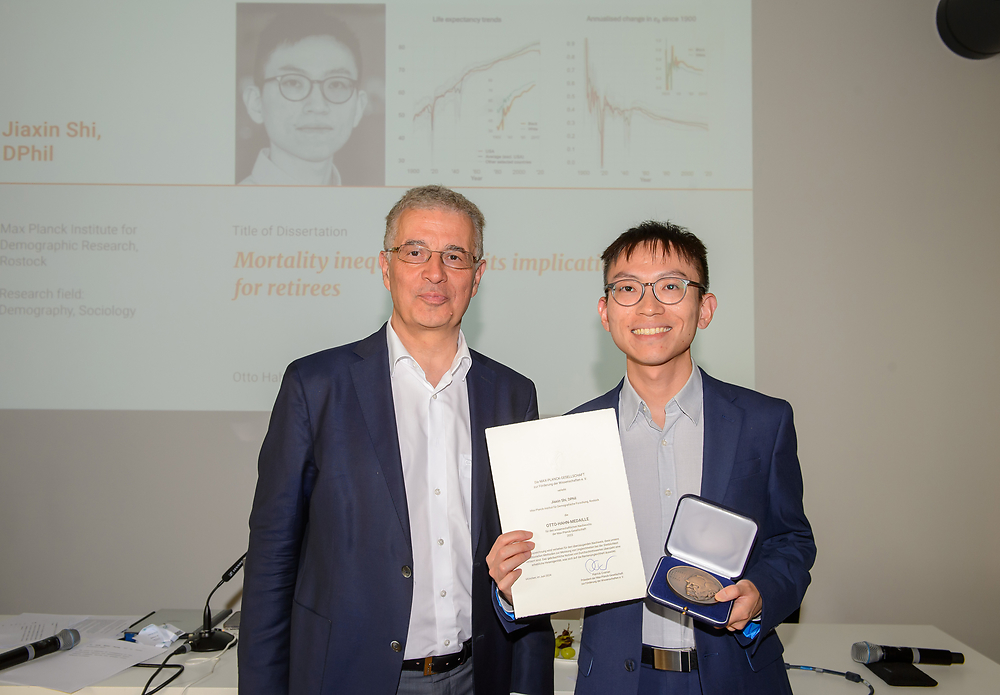June 14, 2024 | News | Award
Jiaxin Shi receives Otto Hahn Medal
On June 12, former MPIDR researcher Jiaxin Shi was awarded the Otto Hahn Medal in Munich for his doctoral thesis on "Mortality Inequality and Its Implications for Retirees". The medal was awarded at the annual meeting of the Max Planck Society. In his thesis, Jiaxin presented four studies on mortality inequality that advance the knowledge of how life expectancy differs across social groups and the implications for retirees. The results of his work show that the greater longevity of socially advantaged groups accounts for up to a quarter of lifetime pensions.

Jiaxin Shi received the Otto Hahn Medal. © © David Ausserhofer / Max-Planck-Gesellschaft
"I congratulate Jiaxin on this highly coveted award. Jiaxin is one of the most talented, curious, and hardworking demographers of his generation. When he gets an idea in his head, he will go to great lengths to see it through to fruition. His future is bright, and I have no doubt that he will make a lasting impact on the field," says Alyson van Raalte, his thesis advisor and MPIDR research group leader. "During his four years at MPIDR, Jiaxin has completed seven articles, all of which have been published in top journals in demography and related social science disciplines. The common thread in all of his papers is that our traditional ways of measuring socioeconomic inequalities in mortality can be biased by their simplistic assumptions and over-reliance on average outcomes."
Jiaxin Shi's dissertation examined the extent to which findings from more sophisticated and nuanced measures of mortality inequality by socioeconomic status agree with our baseline evidence based on simpler measures of inequality, such as life expectancy differences. The paper was groundbreaking in showing that they do not - traditional measures of inequalities are biased and overly reliant on average outcomes. Its main findings were:
- To link the sociological concept of stratification to age-at-death distributions, showing that these distributions are increasingly non-overlapping across income quintiles, even during periods of converging life expectancy.
- Demonstrating that the length of life spent in retirement is more equal across educational groups when actual retirement behavior and re-entry dynamics are taken into account.
- Mortality inequalities, which lead to differences in the length of pension receipt across social groups, contribute to a substantial part of the overall lifetime pension inequality, even when pensions are assumed to be progressive.
In his dissertation, Jiaxin presented four studies on mortality inequality that advance knowledge of how life expectancy differs across social groups and the implications for retirees. The results of his work show that the greater longevity of socially advantaged groups accounts for as much as a quarter of lifetime pensions.
“I am thrilled and honoured to receive this year’s Otto Hahn Medal. This is recognition of not only myself but also my advisors and collaborators, who have taught me how to do research, and have kept inspiring and supporting me - especially Alyson, I am grateful that she took me as her student when I knew little about demography. It has been the best decision of my life to spend the formative years of my career at the MPIDR, a place full of fantastic people and talented researchers.”
Jiaxin Shi completed his Ph.D. at the University of Oxford and was part of the The International Max Planck Research School for Population, Health and Data Science (IMPRS-PHDS), a three-year doctoral program that merges demography, epidemiology and data science. The thesis was supervised by Alyson van Raalte (MPIDR) and Christiaan Monden (University of Oxford). Jiaxin spent his four years at MPIDR and conducted his research in the Lifespan Inequalities Research Group. Jiaxin is now a postdoctoral fellow at the Center for Demography of Health and Aging at the University of Wisconsin-Madison.
Each year, the Max Planck Society awards the Otto Hahn Medal to a young scientist for outstanding scientific achievements, usually in the context of a doctoral thesis. The award is intended to motivate highly talented young scientists to pursue an academic or research career. Since 1978, more than 850 scientists and researchers have received the Otto Hahn Medal. The award is presented during the General Assembly of the following year.